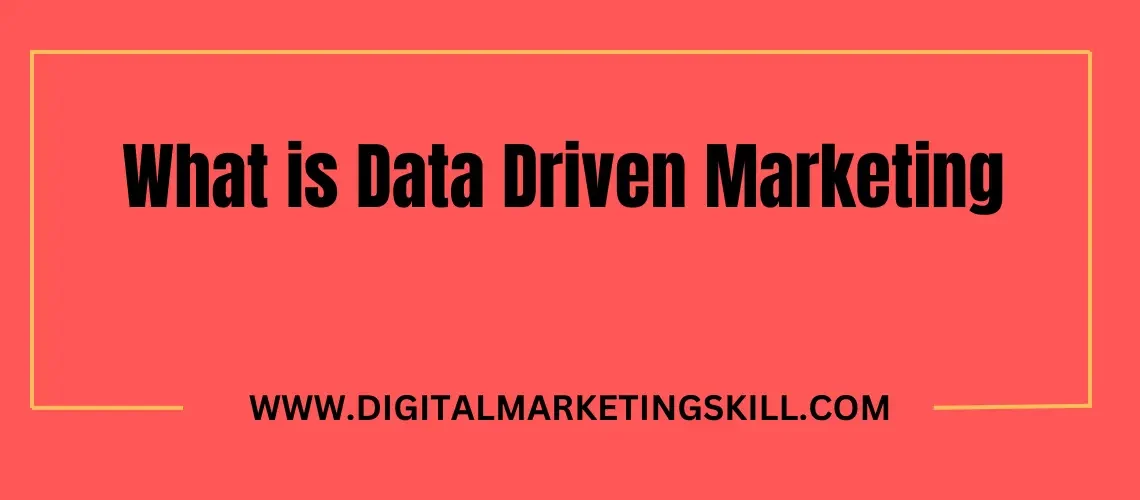Data-driven marketing is changing the way businesses reach their customers. This is because marketing is constantly changing, therefore data-driven strategies have become a must. Consumer preferences evolve quickly, and new technologies keep appearing. Marketers can use data analytics to understand their customers better. This helps them create targeted campaigns that speak to the needs of specific groups of people.
This blog post will explain what data-driven marketing is, its benefits and how to do it.
What is Data Driven Marketing?
Data-driven marketing is the strategic use of customer data to inform every aspect of your marketing initiatives. This data encompasses a wide range of sources, including website analytics, customer relationship management (CRM) systems, social media interactions, and even surveys. By meticulously collecting, analyzing, and interpreting this data, marketers gain invaluable insights into customer behavior, preferences, and buying habits.
With this new data, marketers can now develop precise messages for specific customer groups instead of using general ones. By utilizing data-driven marketing, they gain a thorough grasp of the customer’s experience, enabling them to tailor their strategies to each interaction. As a result, businesses can optimize their marketing investments, deliver more effective campaigns, and ultimately increase their return on investment.
Data-Driven Marketing vs. Traditional Marketing
Despite the common aim of connecting with customers, data-driven and traditional marketing differ in their approaches. Traditional marketing uses a broad approach, with tactics like TV ads, print ads, and billboards, which aim to generate awareness but may not target the most relevant audience.
In contrast, data-driven marketing flips the script. It prioritizes a targeted approach, meticulously segmenting audiences based on the insights gleaned from customer data. This allows for the creation of personalized messages that resonate more deeply with specific demographics and interests. Furthermore, traditional marketing often struggles to measure the effectiveness of campaigns definitively. Metrics like brand recall or the number of impressions generated provide limited insights.
Data-driven marketing, on the other hand, thrives on measurable results. By leveraging website analytics and conversion tracking tools, marketers can precisely gauge the impact of their campaigns. This allows for continuous optimization and refinement, ensuring that marketing efforts are delivering the greatest possible return on investment. In essence, data-driven marketing represents a paradigm shift, transforming marketing from an art form informed by educated guesses to a data-centric science that delivers quantifiable results.
If you want to learn how to utilize customer data to make informed decisions, all you need to do is acquire and hone your digital marketing skills by enrolling in some or all of the courses listed to get started.
Benefits of Data-Driven Marketing
Tools that enable businesses to effectively target their audiences with tailored messaging at the optimal moment are invaluable. Data-driven marketing provides numerous benefits that can substantially boost your marketing initiatives.
Let’s delve into some of the key benefits that make data-driven marketing a powerful asset:
Personalization
Using customer data, marketers can customize the experience for each customer. This can include personalized emails, product suggestions tailored to their browsing history, or website content that changes based on their preferences. This personalization helps build stronger customer connections and enhances brand loyalty.
Enhanced Targeting
By leveraging customer data, marketers can move beyond broad demographics and craft highly targeted campaigns. This ensures that your message reaches individuals who are genuinely interested in your product or service, leading to a more engaged audience and improved conversion rates.
Informed Decision-Making
Data empowers marketers to make decisions based on concrete information rather than speculation. Analyzing customer data provides insights into their preferences, behaviors, and needs. This knowledge enables marketers to allocate budgets effectively, choose appropriate marketing channels, develop targeted content, and craft compelling messaging strategies.
Measurable ROI
Unlike traditional marketing methods, data-driven marketing allows for the precise measurement of campaign performance. Marketers can track key metrics such as click-through rates, conversion rates, and customer acquisition costs. This data provides valuable insights that enable marketers to optimize campaigns for maximum return on investment.
Improved Customer Insights
Data analysis provides a deep understanding of customer behavior and preferences. This knowledge allows businesses to identify trends, anticipate customer needs, and continuously refine their product or service offerings to better meet customer expectations.
How to Do Data-Driven Marketing Based on Data
Having established the significance of data-driven marketing and explored the potential roadblocks, a crucial question remains: how can businesses translate data insights into actionable marketing strategies?
Define Your Goals
No marketing strategy, regardless of its approach, can succeed without well-defined targets. Determine what you want to achieve through your marketing efforts. Do you aim to raise brand recognition, produce leads, boost sales, or strengthen customer relationships? Specify your goals to guide data gathering and analysis, giving direction to your marketing strategy.
Identify the Right Data
Not all data is created equal. To make informed decisions, you need to identify the specific data sets that will provide valuable insights aligned with your marketing goals. This may encompass website traffic data, customer demographics, purchase history, email engagement metrics, or social media analytics.
Collect and Integrate Data
After determining the necessary data, create a system for gathering it from different sources. This could involve linking your CRM system to your website analytics tool or connecting your social media accounts to a marketing automation platform.
Clean and Organize Your Data
Raw data often requires cleaning and organization before meaningful analysis can occur. This may involve eliminating duplicates, correcting inconsistencies, and formatting the data for compatibility with your chosen analytics tools.
Analyze and Interpret Data
With your data clean and organized, it’s time to leverage data analysis tools to uncover patterns and trends. Look for correlations between customer behavior and marketing initiatives. Data visualization tools can be instrumental in presenting your findings in a clear and actionable format.
Develop a Data-Driven Marketing Strategy
Armed with your data-driven insights, you can now craft a targeted marketing strategy. This strategy should encompass elements such as audience segmentation, personalized messaging, content creation tailored to customer needs, and the selection of the most effective marketing channels to reach your target audience.
Measure and Optimize
In data-driven marketing, you run campaigns and then keep a close eye on how they’re doing based on specific goals and metrics (KPIs). This monitoring shows you what parts of the campaign are effective and where there’s room for improvement. You can then use this feedback to make adjustments and fine-tune your strategy over and over, ensuring your marketing efforts have the biggest impact possible.
Transforming data into actionable marketing strategies requires a systematic approach. By following these steps and fostering a data-driven culture within your organization, you can unlock the true power of customer data and achieve remarkable results with your marketing efforts.
The Challenges of Data-Driven Marketing
Analytical Skills and Resources
Extracting meaningful insights from vast data sets requires a skilled workforce with strong analytical capabilities. Businesses may need to invest in training or hire personnel with expertise in data analysis and interpretation to effectively leverage their customer data.
Data Security and Privacy
Customer data privacy regulations are constantly evolving, and navigating this complex landscape can be challenging. Businesses must ensure they are compliant with data privacy laws while still collecting the data necessary to fuel their marketing efforts. Striking this balance requires careful planning and implementation of robust data security measures.
Data Quality and Consistency
The foundation of successful data-driven marketing lies in high-quality, accurate, and consistent data. In reality, businesses often struggle with siloed data sets stored across various platforms. This fragmented data can be incomplete or outdated, leading to skewed insights and unreliable decision-making.
Organizational Culture Shift
Transitioning to a data-driven marketing approach often requires a shift in organizational culture. Businesses may need to overcome internal resistance to change and foster a culture that embraces data-driven decision-making across all departments.
Technological Infrastructure
Data-driven marketing necessitates a robust technological infrastructure. Businesses may need to invest in marketing automation platforms, data management tools, and analytics software to effectively collect, store, and analyze customer data.
Data-Driven Marketing Examples
Here are a few real life examples that illustrate the impact of data-driven marketing strategies:
Personalized Product Recommendations: Amazon, the e-commerce giant, is renowned for its sophisticated data-driven marketing approach. By analyzing customer behavior, purchase history, and browsing patterns, Amazon personalizes product recommendations, email campaigns, and targeted ads. This level of personalization has significantly boosted customer engagement and sales, making Amazon a prime example of data-driven marketing excellence.
Targeted Email Marketing: Gone are the days of generic email blasts. Data-driven marketers leverage customer data to segment their email lists and craft targeted campaigns. This might involve sending emails with special offers relevant to a specific customer’s purchase history or tailoring the email content based on the recipient’s demographics or interests. These targeted email campaigns boast significantly higher open rates and click-through rates compared to generic mailouts.
Retargeting Ads: Data-driven marketing allows businesses to focus their marketing efforts on people who have already shown interest in their products or services by visiting their website. Using information from website cookies and browsing history, businesses can show ads to these potential customers on other websites, reminding them of the products or services they viewed and encouraging them to complete the purchase. This retargeting approach helps businesses reach customers who may have left the website without completing a transaction, increasing the chances of converting them into paying customers.
Dynamic Content Marketing: Many businesses utilize data to personalize website content. Imagine a visitor browsing a travel website. Data-driven marketing allows the site to display content tailored to the visitor’s location, past searches, or even travel preferences gleaned from social media profiles. This dynamic approach delivers a more relevant and engaging user experience, leading to a higher likelihood of conversions, such as booking a trip.
What are the Future Trends in Data-Driven Marketing?
With ongoing technological advancements, the world of data-driven marketing is about to change dramatically. Businesses that stay ahead by using the latest tools and methods can thrive in the ever-changing marketing environment. Here are some key trends in data-driven marketing that will reshape the sector in the years to come.
The Rise of Artificial Intelligence (AI)
Artificial intelligence (AI) is revolutionizing industries, including marketing. We can expect increasing use of AI in data analysis, where AI-powered tools will streamline tasks, reveal hidden data patterns, and produce predictions that can enhance marketing strategies.
Omnichannel Marketing Integration
Data-driven marketing will still heavily rely on omnichannel marketing, where various channels and customer touchpoints are flawlessly connected. Businesses can construct a consistent and tailored customer experience by consolidating customer data from many sources, such as social media, emails, website interactions, and in-person interactions. So, this omnichannel approach allows for precise messaging, constant branding, and improved customer interaction across all channels, which increases conversions and builds customer loyalty.
Voice Search Optimization and AI-Powered Voice Assistants
With the rising popularity of voice search and AI-powered voice assistants like Siri and Alexa, optimizing marketing strategies for voice-based interactions will be a crucial trend in data-driven marketing. Businesses will need to adapt their SEO strategies, content creation, and advertising campaigns to cater to voice search queries and commands. Therefore, by embracing voice search optimization and integrating AI-powered voice assistants into their marketing efforts, businesses can enhance brand visibility, improve user experience, and capture new opportunities in the voice-first era.
Focus on Customer Lifetime Value (CLV)
Data will become crucial in changing the focus of marketing from gaining new customers to keeping existing ones. Businesses can use data to determine how valuable each customer is over time. This helps them create specific plans to strengthen current relationships and get the most value from each customer.
Conclusion
In today’s dynamic digital age, customers leave behind a rich trail of data with every interaction. Data-driven marketing empowers businesses to harness this valuable resource, transforming customer insights into actionable strategies. By meticulously collecting, analyzing, and interpreting customer data, businesses can craft targeted messages that resonate with specific audiences, personalize the customer experience, and ultimately achieve a measurable return on investment.
Join Digital Marketing Skill Instiute (DMSI) to shape the future of marketing through data-driven insights to drive growth for your business.
FAQs
What is an example of data-driven content marketing?
One example of data-driven content marketing is creating blog posts or infographics based on what your target audience is searching for online. You can use website analytics tools or keyword research to understand these trends and tailor your content to their interests.
How effective is data-driven marketing?
Using data to drive marketing strategies has proven highly effective. Research has demonstrated that this approach can enhance conversion rates, streamline customer acquisition, and increase return on investment (ROI). The secret lies in the ability to create targeted campaigns, tailor them to individual customers, and track their impact. However, achieving success with data-driven marketing requires access to reliable data and a well-defined strategy.
What is data-driven marketing strategy?
A data-driven marketing strategy uses customer data to inform every step of your marketing efforts. This involves collecting data, analyzing it to understand customer behavior, and then using those insights to create targeted campaigns, personalize the customer experience, and measure results for continuous improvement.
Additional Resources
10 Ways To Optimize Your Site for Voice Search Optimization
20 Best Marketing Automation Tools for Small Business in Nigeria
How to Create a Marketing Budget for Small Business
What is a Digital Marketing Campaign – Types and Strategies






